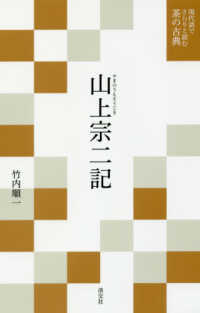- ホーム
- > 洋書
- > 英文書
- > Literary Criticism
Full Description
American pragmatism is premised on the notion that to find out what something is, look to fruits rather than roots. But the thought of the classical pragmatists is itself the fruit, this book argues, of earlier literary experiments in American literature. Ralph Waldo Emerson, Edgar Allan Poe, Herman Melville, and (contemporaneously with the flowering of pragmatism) Henry James, each in their different ways prefigure at the level of literary form what emerge as the guiding ideas of classical pragmatism. Specifically, this link occurs in the way an experimental approach to composition informs the classical pragmatists' guiding and central idea that experience is not a matter of correspondence but of an ongoing attunement to the process. The link between experience and experiment is thus a way of gauging the deeper intellectual history by which literary experiments such as Emerson's Essays, Poe's invention of the detective story in "The Murders in the Rue Morgue," Melville's strange follow-up to Moby-Dick, Pierre, and Henry James's late style, find their philosophical expression in some of the guiding ideas of classical pragmatism: Charles Peirce's notion of the "abductive" inference; William James's notion of "Radical empiricism" and John Dewey's naturalist account of experience. The book frames this set of claims in relation to more contemporary debates within literary criticism and philosophy that have so far not been taken up in this context: putting Richard Poirier's account of the relation of pragmatism to literature into dialogue with Stanley Cavell's inheritance of Emerson as someone decidedly not a "pragmatist"; to the differences between classical pragmatists like William James and John Dewey and more recent, post-linguistic turn thinkers like Richard Rorty and Robert Brandom.
Contents
Introduction
1/ The Method of Nature
The Unitarian Schism
Uses of Natural History
The Miracles Controversy
Joyous Science
Amor fati (Beautiful Limits)
2/ Non-Reasoning Creatures
Antebellum AI
Peirce Machines
Jumping To Conclusions
Species and Genre
Philosophy of Composition
3/ Unearthing Pierre
Moby-Dick Reviewed
Talking Pictures (Gothic Metaphysics)
Chronometricals and Horologicals
The Refused Daguerreotype
Enceladus and Allegory
4/ The Ambassador Effect
Genteel Tradition
Two Types of Radical Empiricism
The Woollett Scale
Two Types of Cosmopolitanism
"Then there we are!"
Conclusion







